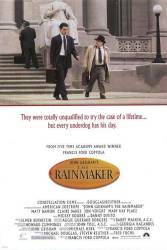Corrected entry: Rudy goes to Cleveland to get depositions under oath from four employees of Great Benefits. He gets quite angry when he realizes that the first two he calls had been fired and can't be heard. The third one is Everett Lufkin who wrote the infamous last letter to Dot Black. Rudy says that he is going to get the deposition from him and pack up and leave after that. We never find out who the fourth one is and why Rudy is not interested in getting his/her deposition. (01:01:55)

The Rainmaker (1997)
1 corrected entry
Directed by: Francis Ford Coppola
Starring: Matt Damon, Jon Voight, Mickey Rourke, Claire Danes
Continuity mistake: One morning Rudy wakes up from the clattering noises Ms. Birdie is making when she unloads a number of biggish garden tools from a wheelbarrow. The camera cuts to Rudy who is trying to sleep while we hear her unloading, then back to Ms. Birdie where the number of tools on the wheelbarrow has gone up again. (00:22:20)
Rudy Baylor: Sworn in by a fool and vouched for by a scoundrel. I'm a lawyer at last.
Question: I have two questions.1. Why would it be important, as Leo Drummond says, that his objections have to be noted, even after they are overruled? 2.After Rudy was finished with the C.E.O., Leo Drummond is allowed to ask the C.E.O. some questions, what good does it do to say that he rests on his objections?
Answer: 1) A lawyer has only to object one time and it be acknowledged by the judge to preserve his right of appeal related to a given legal ruling. He might choose to object a second time in order to eliminate the highly unlikely possibility that the court reporter misheard and inaccurately recorded his first objection and/or it being overruled. 2) The CEO had just been destroyed on direct examination by the plaintiff's lawyer, Rudy, to the point where no questions Drummond might ask had any chance of rehabilitating his client's testimony, and so he passed on asking any questions. Saying, "No questions, your honor, as we instead rely on our earlier objections", Drummond was making a somewhat feeble attempt to imply to the jury that the reason he wasn't asking any questions wasn't because he didn't have any that could help his case, but it was actually because they should not have been allowed in the first place. It was weak, but it was all he had under the circumstances.
Answer: 1) Having his objections noted into the court records would make it easier if the defense decides to appeal the verdict, allowing counsel to cite what aspects of the trail he felt were mishandled. 2) Having him repeat his objections after cross-examining the CEO reminds the jury that Drummond felt it was inappropriate to use stolen documents as evidence in the case, perhaps generating some sympathy.





Correction: Not a mistake since Rudy is still green around the gills as a lawyer. He could have forgotten since he was so upset that he is getting the run-a-round from Great Benefit's lawyers.
William Bergquist